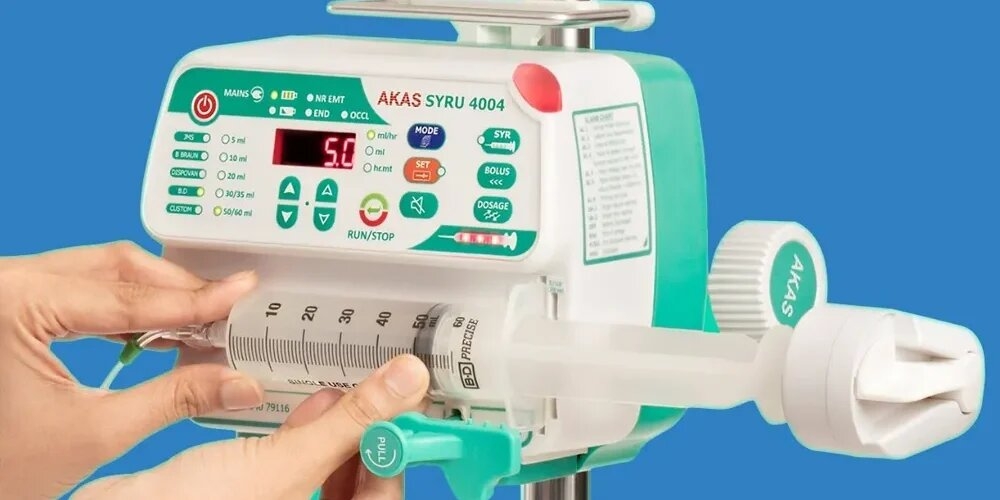Global Demand for Syringe Pumps: Market Trends & Growth

-
Syringe pumps are vital components in modern hospitals, offering precise drug delivery in critical care, surgery, and chronic condition management.
-
The global demand for these systems is growing steadily, fuelled by rising healthcare needs, technological advancements, and improved medical infrastructure.
-
Their role in intensive care, neonatal units, and chemotherapy protocols underscores their significance in patient-focused healthcare.
-
Hospitals increasingly rely on syringe pumps for accurate, continuous infusion of small volumes of medication.
-
This demand is linked to the growing prevalence of conditions like cardiovascular diseases, cancer, and neurological disorders.
-
With healthcare systems worldwide under pressure to improve treatment outcomes, infusion precision is now a critical care standard.
-
The market for syringe pumps has expanded significantly in Asia, Africa, and Latin America, driven by rising investment in hospital equipment.
-
Governments and private sectors are working together to enhance patient care quality by ensuring access to modern medical technologies.
-
Emerging economies are prioritising smart, reliable devices that support evidence-based treatment and operational efficiency.
-
Technological advancement continues to reshape syringe pump design and function across hospitals.
-
Modern pumps feature integrated safety systems, touchscreen interfaces, and wireless monitoring to support real-time decision-making.
-
These enhancements help reduce medication errors, ease staff workload, and improve clinical precision in high-acuity settings.
-
Compact, battery-operated syringe pumps are becoming standard in ambulatory and home-based healthcare services.
-
This shift supports patient-centred care, particularly for palliative, post-surgical, and long-term therapy management.
-
It also reduces hospital stay durations, lowering cost and infection risk for vulnerable patients.
-
Manufacturers are responding with versatile syringe pump models that support a wide range of infusion protocols.
-
Devices now offer programmable settings, multi-language interfaces, and compatibility with various syringe sizes.
-
This adaptability ensures better workflow integration in both large hospital systems and smaller care facilities.
-
In critical care units, where precision matters most, syringe pumps offer unparalleled consistency and reliability.
-
Their controlled dosing is essential for anaesthetics, insulin, vasopressors, and sedatives.
-
These pumps support round-the-clock care in ICUs, emergency rooms, and surgical suites, enhancing treatment accuracy.
-
The demand for smart syringe pump systems is also driven by digital transformation in healthcare.
-
Integration with electronic health records (EHR) and hospital networks allows for automated data capture and infusion logging.
-
This integration streamlines patient documentation, reduces human error, and supports clinical auditing.
-
The COVID-19 pandemic further accelerated global interest in reliable infusion systems.
-
Hospitals faced increased need for ventilator-compatible syringe pumps that could support critical medication administration.
-
As a result, the market saw a significant boost in R&D, leading to more efficient, user-friendly devices.
-
Regulatory standards continue to shape manufacturing practices for syringe pumps across regions.
-
Compliance with international safety certifications such as ISO 13485 and CE ensures device reliability and patient safety.
-
Hospitals seeking high-quality equipment now evaluate suppliers based on their adherence to global standards and post-sale service.
-
Sustainability and energy efficiency are becoming priority features in syringe pump design.
-
Manufacturers are focusing on low-power consumption, recyclable materials, and longer product life cycles.
-
This aligns with hospitals' environmental goals and cost-saving initiatives over the equipment’s lifespan.
-
Training and education are essential to successful syringe pump implementation in medical settings.
-
Healthcare workers must understand operating protocols, alarm systems, and troubleshooting procedures.
-
Reliable suppliers often provide training, technical support, and service packages to ensure optimal use and maintenance.
-
With the rise of remote and outpatient care models, the need for transportable and lightweight syringe pump systems has grown.
-
Devices that ensure safe infusions during patient transfers or home treatments are now critical components of care pathways.
-
This need has opened new markets and product segments for manufacturers focused on flexibility and ease of use.
-
Collaborative research between hospitals and manufacturers is creating opportunities to co-develop purpose-built syringe pumps.
-
Clinical feedback plays a vital role in shaping user-centred design, improving interface simplicity and infusion accuracy.
-
This partnership approach supports continuous innovation, tailored to real-world clinical demands.
-
The competitive landscape is evolving with new entrants and established players investing in syringe pump technologies.
-
Innovation is now driven by AI integration, mobile app control, and predictive maintenance features.
-
These trends point to a future where infusion therapy is more connected, automated, and patient-focused.
-
For hospitals and institutions evaluating suppliers, selecting a trusted manufacturer is critical.
-
Prioritising quality, compliance, support services, and innovation ensures long-term benefits and improved patient outcomes.
-
A dependable syringe pump system becomes not just equipment, but a core component of care delivery.
-
The global syringe pump market is projected to grow significantly over the coming years.
-
This trajectory is shaped by increased demand for high-precision, adaptable, and safe drug delivery tools across all levels of care.
-
Hospitals are preparing for future healthcare challenges by investing in advanced technologies that enhance both efficiency and compassion.
Conclusion
-
As healthcare systems continue to evolve, the need for dependable syringe pump solutions remains at the heart of modern care.
-
Finding manufacturers who deliver quality, reliability, and service excellence is essential for hospitals seeking to provide safe, precise treatment.
-
Akas Infusion manufactures world-class drug delivery devices like syringe pumps and volumetric pumps, supporting hospitals with innovative solutions built for tomorrow’s patient care.
- Questions and Answers
- Opinion
- Motivational and Inspiring Story
- Technology
- True & Inspiring Quotes
- Live and Let live
- Focus
- Geopolitics
- Military-Arms/Equipment
- Segurança
- Economy/Economic
- Art
- Causes
- Crafts
- Dance
- Drinks
- Film/Movie
- Fitness
- Food
- Jogos
- Gardening
- Health
- Início
- Literature
- Music
- Networking
- Outro
- Party
- Religion
- Shopping
- Sports
- Theater
- Health and Wellness
- News
- Culture

